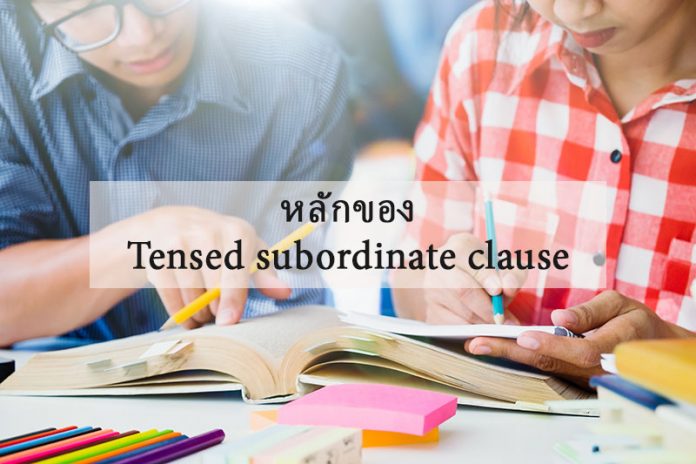Subordinate clause นี้เป็นเรื่องที่มีรายละเอียดปลีกย่อย เราจะมาพูดถึง subordinate clause แบบแรกที่เรียกว่า tensed subordinate clause เป็นบททดสอบที่ออกข้อสอบในทั้ง TOEIC จนถึง IELTS ซึ่งมีอยู่ด้วยกัน 5 ประเภท ดังนี้
1. Noun clause
Noun clause (นามานุประโยค) คือ clause ที่ทำหน้าที่คล้าย noun phrase โดยทั่วไปแล้ว noun clause จะทำหน้าที่เป็น subject, object หรือ complement ของ main clause
เราสามารถจำแนก noun clause ตามรูปร่างหน้าตาของมันได้ 3 ชนิดย่อย ดังนี้
1.1 That noun clause คือ noun clause ที่ขึ้นต้นด้วย conjunction that (คำว่า that ในที่นี้อาจแปลเป็นไทยว่า “ว่า/ที่ว่า/การที่”) ตัวอย่างเช่น
[That no one remembered her birthday] left Jane very depressed.
1.2 Wh- noun clause คือ noun clause ที่ขึ้นต้นด้วย wh- (พี่ชอบอ่านว่า “เหวอะ”)
- John gave his children [what they wanted]. จอห์นให้ลูกๆ ในสิ่งที่พวกเขาต้องการ
1.3 If/whether noun clause คือ noun clause ที่ขึ้นต้นด้วย if หรือ whether (แปลว่า “หรือไม่”)
- [Whether Mike likes the present] is not clear to me. เรื่องที่ไมค์ชอบของขวัญหรือไม่นั้น ไม่ค่อยชัดเจนกับฉัน
2. Adverbial clause
Adverbial clause (วิเศษณานุประโยค) คือ clause ที่ทำหน้าที่คล้าย adverb หรือพูดให้ชัดคือทำหน้าที่ adverbial นั่นเอง บางคนอาจจะเรียกมันว่า adverb clause ก็ได้
โดยทั่วไปแล้ว adverbial clause จะทำหน้าที่ให้ข้อมูลแวดล้อมเพิ่มเติมแก่ main clause (หรืออาจกล่าวว่ามันทำหน้าที่ขยายกริยาของ main clause) เราสามารถชี้ตัว adverbial clause นี้ได้ไม่ยากเลยครับ เพราะมันจะขึ้นต้นด้วย conjunction ให้เห็นกันจะจะ ไม่มีการหลบซ่อนตัว ตัวอย่างของ conjunctions ที่ใช้ขึ้นต้น
adverbial clause ก็ได้แก่ where, when, before, after, as, while, until, since, as if, as though, because, so that, if, unless, although, though เป็นต้น
- Jane was six [when her mother died]. เจนอายุได้ 6 ปี ตอนที่แม่เธอตาย
3. Relative clause
Relative clause (คุณานุประโยค) คือ clause ที่ทำหน้าที่ขยาย noun หรือ pronoun เพราะฉะนั้นบางคนอาจจะเรียกมันว่า adjective clause ก็ได้
- You are free to marry the man [{who/whom} you love]. คุณมีอิสระที่จะแต่งงานกับผู้ชายที่คุณรัก
- Sunday is the only day [when I can relax]. วันอาทิตย์เป็นวันเดียวที่ฉันสามารถผ่อนคลายได้
4. Comparative clause
Comparative clause เป็น clause ที่เกี่ยวข้องกับการเปรียบเทียบ ปกติแล้ว comparative clause จะขึ้นต้นด้วยคำว่า than หรือ as
- Chiang Mai is more crowded [than it used to be]. จังหวัดเชียงใหม่แออัดขึ้นกว่าที่มันเคยเป็น
- He is as smart [as she is]. เขาฉลาดพอ ๆ กับหล่อนเลย
- It was such an extraordinary story [that no one believed a word of it]. มันเป็นเรื่องที่เกินธรรมดาเสียจนไม่มีใครเชื่อสักคำ
5. Prepositional clause
Prepositional clause มีโครงสร้างคือ preposition + wh- noun clause
- We have little evidence [of who committed the murder]. เรามีหลักฐานน้อย (ไม่เพียงพอ) ที่จะระบุว่าใครเป็นฆาตรกร
- You would be surprised [at how much things have changed]. แกจะต้องแปลกใจว่าอะไร ๆ มันเปลี่ยนไปมากแค่ไหน
สรุปว่าสิ่งที่ควรจำเกี่ยวกับ preposition ก็คือ “นอกจาก preposition จะตามหลังด้วย noun phrase หรือ Ving แล้ว มันยังสามารถตามหลังด้วย wh- noun clause ได้ด้วย”












